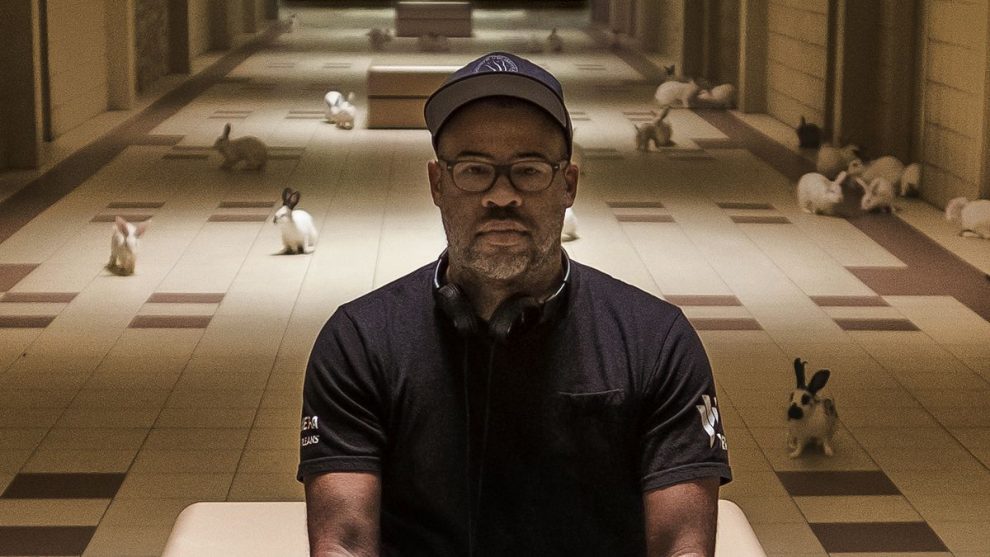On Monday, as the town buzzed about new box office records set by Us, the film’s 40-year-old director, Jordan Peele, was not wiling away the hours in a Universal lot bungalow fielding congratulatory calls from studio execs. Peele was on a cramped stage in East Hollywood at improv mecca Upright Citizens Brigade Theatre, the starriest guest yet for the school’s new conversation series.
There was a sense of familiarity hovering over the proceedings. No surprise, as Peele got his start in improv before landing on MADtv in 2003, then achieving sketch-comedy stardom with Comedy Central’s Key & Peele in 2012.
Peele gave the standing-room-only audience — a diverse set of 20-something improv students, aspiring storytellers and fans — about an hour and 20 minutes of his time in a wide-ranging conversation that covered his hugely successful career, his marijuana dependence (a double-edged sword), the making of Get Out, inclusive casting and his favorite Twilight Zone episode.
The audience gave Peele a raucous standing ovation when he entered the room, a conquering hero dressed down in dark denim jeans, black Nikes, an Aviator Nation hoodie and T-shirt with Corey Feldman’s face on it, for some reason.
UCB co-founder and moderator Ian Roberts, who executive produced Key & Peele, began by mentioning Us‘ $88 million global box office haul — the “second-biggest opening for an original live-action film,” he noted. Added Peele: “That’s after Avatar. The stats get cooler when you say the thing that beat me.”
“The best way to end this great weekend is with you guys,” Peele told the crowd of 200. The moderator asked Peele when he first recognized his earliest glimmers of talent. That would be when Peele was in fifth grade doing a stint at TADA! Youth Theater in New York City. He recalled feeling a “burning sensation in my gut” that was hotter than his shyness. Peele was cast in a show that proved to be “the first win in a long career of wins and losses.”
From an early age, Peele showed natural skill at drawing, painting and other visual arts. “But the performing part came out of nowhere,” he recalled. “It surprised everyone.” No one more so than his single mother. “When I was 7, I did an impression of Ronald Reagan and my mom gave me great feedback,” he said, before launching into that wobble-headed impression with a raspy, “Hello.”
US ‘winning decisively’ against Iran, will achieve ‘complete control’ of airspace within days, Hegseth says
Metal detector scans front yard of Savannah Guthrie’s missing mother as sister to get car back
Trump May Be Fulfilling a Major Biblical Prophecy – As We Speak, Jeremiah 49 Appears to Be Coming True
Former MLB star Mark Teixeira wins GOP primary in Texas congressional race
Former Red State Mayor Found Guilty After What Her Kids Saw Her Doing
Pentagon identifies 4 of 6 US service members killed in drone attack and more top headlines
Newsom Taken to Task After He Rages at SCOTUS for Critical Transgender Ruling
Comer to say Tim Walz ‘enabled fraud,’ failed whistleblowers in bombshell Minnesota hearing
New details expose how a former top Trump official got caught in Epstein’s web of influence
Blue State Drivers Are Getting Hammered: ‘One of the Least Affordable Necessities of Daily Life’
Minnesota police sergeant, father of two, dies suddenly after brain infection
Jasmine Crockett suggests GOP rigged her Democratic Primary election: ‘This is what Republicans like to do’
Republican congressman accused of affair with late aide to face runoff election
US, Ecuador launch joint operations targeting narco-terror groups: SOUTHCOM
Combustible Republican Senate primary in Texas heading into overtime
He credited his skill with impressions and, later, improv to his ears. The art of listening, he continued, is something that continues to inform and elevate his work. “Nothing is more important,” Peele insisted. “The more you are armed with what you take in, the more ammo you have. … Directing for me is about hiring the right people, listening to them and helping them do the best job possible.”
Peele said he’s also learned how to listen to his ego — and to turn down the volume. “You have to shelve it,” he said. “You have to check it constantly. It’s so easy for it to come out and rear its ugly head.” That can happen anywhere from the set of a $20 million horror film to the humble improv stage. “The ego is deceptive and it will screw you up,” he said, adding that when it comes to performing, the “honest response” will always get the biggest laugh.
He name-checked Steve Martin and Martin Lawrence as major influences in comedy; in directing, he listed Tim Burton (“the aesthetic and the fact that he was telling these fairy tales about ‘the other’”) and Ridley Scott (“Alienand Thelma & Louise were two really important movies for me — very different, but perfect”). In high school, he knew he wanted to be a director, but rather than go to NYU to study film, he picked private liberal arts school Sarah Lawrence College in Yonkers, New York.
“The day I didn’t go to NYU, I said maybe [directing] wasn’t for me,” he recalled. In the end, Sarah Lawrence wasn’t for Peele, either. He dropped out after two years in order to study improv and sketch comedy, noting a dearth of black performers in those fields, a hole he intended to fill. “I knew I had to leave,” Peele said. “But it’s not a classically lucrative industry, so it’s not like I can recommend that black people get into it because it doesn’t pay.” The line drew weary laughter.
He moved to Chicago and studied at Second City, where he met Keegan-Michael Key. The two brought their talents to Los Angeles and landed on their feet with gigs on MADtv. Toward the end of his contract on the Fox sketch show, Peele said he was offered his dream gig: a spot in the cast of Saturday Night Live. It was around the time that then-Senator Barack Obama was “becoming a thing,” he explained, and Peele did an uncanny impression of the future president. But MADtv producers wouldn’t let him out of his contract, ending his SNLdreams.
He locked himself in a room and started smoking a lot of weed, plotting his revenge, “like a comic book supervillain,” he explained. Then it hit him: “I wanted to be a producer,” he realized. “These producers are making these decisions about art and comedy and they don’t know anything about art and comedy. I want to be a producer and bring my artistry and they’ll all be sorry.”
Peele decided he first had to “be great” and gave himself “seven to eight” years to get there. So he started developing multiple projects simultaneously to see what stuck. Get Out was one of those early scripts. “Every two weeks I’d go, ‘What the fuck am I doing? I’m writing a movie where a black man is victimized and all the white people are evil and I’m trying to get the audience to have fun,'” he recalled. “But if you could make that fun … that’s what brought me back.”
He eventually finished the script. Producer Sean McKittrick bought the thriller spec on the spot, to Peele’s utter surprise. That turned to shock when McKittrick said he was on board with the idea of Peele directing it himself.
US ‘winning decisively’ against Iran, will achieve ‘complete control’ of airspace within days, Hegseth says
Metal detector scans front yard of Savannah Guthrie’s missing mother as sister to get car back
Trump May Be Fulfilling a Major Biblical Prophecy – As We Speak, Jeremiah 49 Appears to Be Coming True
Former MLB star Mark Teixeira wins GOP primary in Texas congressional race
Former Red State Mayor Found Guilty After What Her Kids Saw Her Doing
Pentagon identifies 4 of 6 US service members killed in drone attack and more top headlines
Newsom Taken to Task After He Rages at SCOTUS for Critical Transgender Ruling
Comer to say Tim Walz ‘enabled fraud,’ failed whistleblowers in bombshell Minnesota hearing
New details expose how a former top Trump official got caught in Epstein’s web of influence
Blue State Drivers Are Getting Hammered: ‘One of the Least Affordable Necessities of Daily Life’
Minnesota police sergeant, father of two, dies suddenly after brain infection
Jasmine Crockett suggests GOP rigged her Democratic Primary election: ‘This is what Republicans like to do’
Republican congressman accused of affair with late aide to face runoff election
US, Ecuador launch joint operations targeting narco-terror groups: SOUTHCOM
Combustible Republican Senate primary in Texas heading into overtime
Budgeted at $5 million, the film became a cultural phenomenon, earning north of $250 million worldwide and winning Peele an Oscar for best original screenplay. He saw his status in Hollywood change almost overnight. With the success of Us, he’s now well on his way to joining the rarified ranks of blockbuster auteurs like Christopher Nolan and personal hero Scott.
Fame is still something he’s figuring out. “I don’t envy someone who gets famous overnight,” Peele cautioned. “The hardest part is being recognized. I used to think that being in the public eye gave you power. But all of a sudden, they have the power and can come up to you an hour into dinner.”
But there are other kinds of power, and Peele plans on wielding his judiciously. One way is to continue putting black faces on the screen in leading roles. “The way I look at it,” he explained, “I get to cast black people in my movies. I feel fortunate to be in this position where I can say to Universal, ‘I want to make a $20 million horror movie with a black family.’ And they say yes.”
It’s a formula he’s not interested in messing with.
“I don’t see myself casting a white dude as the lead in my movie. Not that I don’t like white dudes,” he said, nodding over to his moderator pal Roberts. “But I’ve seen that movie.” The line drew loud applause and shouts of agreement. “It really is one of the best, greatest pieces of this story, is feeling like we are in this time — a renaissance has happened and proved the myths about representation in the industry are false.”
During an audience Q&A, a woman asked Peele to name his favorite episode of The Twilight Zone, seeing as he’s taking over from Rod Serling for CBS All Access’ planned reboot of the sci-fi anthology series.
Peele cited “The Monsters Are Due on Maple Street.” The story centers on what happens to a neighborhood when they fear aliens have landed in their town. “It points out the ugliness and flaws of humanity,” Peele explained. “That’s what I like to do with my stories. The real monsters are within us. When people get together we are the greatest monster we’ve ever known.”
Story cited here.
























